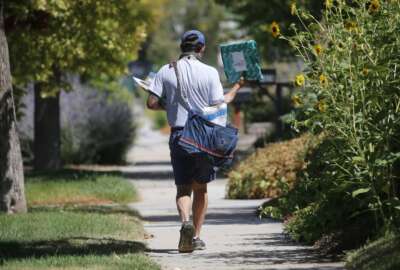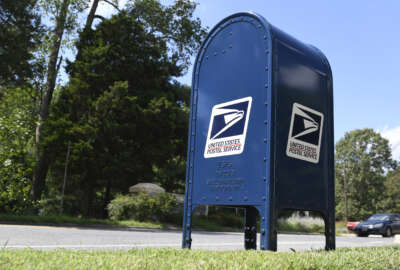‘We can’t pay our bills’: USPS rural carriers feel toll from ongoing payroll errors
Rural carriers across the country said they received an incomplete paycheck for the second pay period in a row this Friday, or are still waiting on their Sept. 1...
Postal Service rural mail carriers who missed a paycheck, or received a partial paycheck, two weeks ago because of a USPS payroll error are still waiting to get paid — and in some cases, are seeing the same problems persistent for another payday.
More than half a dozen rural carriers across the country told Federal News Network they received an incomplete paycheck for the second pay period in a row this Friday, or are still waiting on their Sept. 1 paycheck. Rural carriers requested anonymity to discuss their circumstances.
A rural carrier in Missouri said that none of his coworkers have received their Sept. 1 paycheck, “that we were assured we would have no later than today, 9/15.”
“This is a HUGE problem and burden for us,” the carrier said.
The National Rural Letter Carriers Association estimates the USPS payroll issue has impacted approximately 53,000 rural carrier employees — most of them non-career rural carriers that cover routes for full-time career mail carriers as needed.
The union posted on its website on Thursday that, “although there have been sporadic reports of missing paychecks or $0 paychecks this pay period, there have been no system-wide issues.”
“Any reports from this pay period are all local issues and will require an adjustment at the local level,” the union wrote.
A rural carrier in Maine said she didn’t receive her Sept. 1 paycheck on time, and is still waiting for it.
“I was told, ‘Well it will be in the next one, then.’ It’s a joke. A federal company should have issued a money order for our full checks that day. Not part of what they think it should be,” the carrier said. “Yet all the mail has to go out, right?”
NRLCA National President Don Maston said Thursday that the union has “not been made aware by USPS of any issues this pay period and do not foresee any problems with this Friday’s paycheck.”
Maston said in an interview earlier this month that the recent USPS payroll error caused more of a headache than any other IT glitch of its kind in recent history.
Given the magnitude of the problem, he said rural carriers still waiting to receive their Sept. 1 paycheck may have to wait longer than they initially expected.
“Depending on how complicated adjustments are, it may be another pay period or two before those adjustments are finalized,” he said.
Another rural carrier said he received a money order in lieu of his regular paycheck on Sept. 1, but said his Sept. 15 paycheck “is still incorrect,” and is only about 75% of his regular take-home pay.
“When trying to contact payroll, you are redirected to your supervisor. When you and your supervisor attempt to contact payroll together, the call is disconnected. The response from the supervisor is, there is nothing they can do,” the carrier said.
“This is the federal government, and things like this should not be happening at all. We need real help in getting this resolved. It’s affecting all families. We can’t pay our bills,” the carrier said. “The postmaster and the supervisors should be escalating this up to the highest level, instead of being relaxed about it. “
USPS gave impacted employees the option of receiving their Sept. 1 paycheck as a “salary advance” issued as a money order. Rural carriers who accepted the money orders would receive 65% of their gross pay — a rough estimate of their typical take-home pay.
Rural carriers are not required to pay back the salary advance until the Postal Service has paid them for the missing pay resulting from the USPS system error.
USPS spokeswoman Darlene Casey told Federal News Network that the “Postal Service continues to expeditiously work on the payroll adjustments to reflect updates to paychecks.”
Casey added that 68% of impacted employees, as of Sept. 12, have requested and received an advance in the form of a no-fee money order.”
“The remaining employees’ supervisors continue to stand ready to process a salary advance upon request,” Casey said in a statement.
Another carrier explained that over half of the carriers at his office chose not to take the salary advance, because of the administrative challenges of paying the advance back to USPS.
“Many carriers in my office that have chosen to take the salary advance in the past when this has happened, have had nightmare issues with USPS taking the salary advance back from them out of their paychecks before ever giving them the corrected paycheck,” the carrier said. “By taking the salary advance it has caused a ton of headaches for people in the past.”
The carrier said he and his coworker also opted out of the salary advance because they thought they’d get their Sept. 1 backpay this period – but they’re still waiting.
“We are still waiting to get paid,” the carrier said. “I was under the impression that by not taking the advance, I would receive the corrected paycheck this pay period. That did not happen as I am still waiting for it to be corrected,” he said.
Another rural carrier, with more than 38 years of service at USPS, said his Sept. 1 paycheck was more than $1,000 short. Part of the pay issue is that the carrier didn’t receive his Equipment Maintenance Allowance, a mileage reimbursement paid to employees who use their own private vehicles on their delivery routes, as part of the salary advance.
“How do they expect us to pay for our gas, vehicle repairs, and other vehicle problems? The gas card bill came like it always does but waiting on the USPS to pay for our EMA,” the carrier said.
The reimbursement, he added, is needed to cover gas and wear-and-tear on his vehicle, which covers a 125-mile route each workday
NRLCA said it attempted to bargain with USPS to ensure impacted rural carriers would also get 100% of their EMA if they opted into the salary advance. The union, however, said it was not successful in this effort, since the EMA “is not currently a contractual right.”
The ongoing payroll issues add to a litany of frustrations rural carriers are feeling. About two-thirds of rural carriers saw pay cuts in May, after USPS rolled out a new pay system that has been in the works for more than a decade.
The new system is the product of arbitration between USPS and the NRLCA more than a decade ago, after both parties failed to agree on how to design a new pay system on their own for rural carriers.
However, several thousand rural carriers have signed a petition to certify the NRLCA, over concerns that the union didn’t do more to prevent the rollout of the Rural Route Evaluated Compensation System (RRECS).
The rural carrier with 38 years of service said his pay was cut by nearly $16,000 under RRECS, “due to a faulty system of figuring out how to evaluate dual-ZIP code routes.”
“There was a time when I was proud to work for the USPS. That is no longer the case,” he said.
Another full-time regular rural carrier said USPS is struggling to hire and retain employees because of these pay issues and work conditions.
“Management every day violates union contracts with no consequences of any nature. Supervisors can mess up payroll constantly with no consequences for their actions,” the carrier said.
Another rural carrier in Ohio said he encountered a similar payroll issue in September 2022, and had to wait until February 2023 to finally receive that paycheck.
“I contacted the union no less than 10 separate times, and every time I was told there was nothing that could be done on their end that I would just have to ‘wait it out,'” the carrier said. “During this time, not only did I contact my union, but spoke several times with payroll directly. Every time I was told it was ‘pending’ or ‘being reviewed.'”
“Nobody seemed to care because it wasn’t their money missing. I will be absolutely amazed and shocked if this current situation doesn’t take months to correct,” he added.
Copyright © 2025 Federal News Network. All rights reserved. This website is not intended for users located within the European Economic Area.
Jory Heckman is a reporter at Federal News Network covering U.S. Postal Service, IRS, big data and technology issues.
Follow @jheckmanWFED






